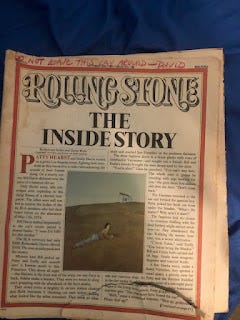(This is originally from June 2023.)
Those of us working at sites like HotWired and Salon in the early days of the web realized that we were sitting atop a technology that would profoundly change virtually everything about society.
With my background in investigative reporting, I was curious about how the process of solving mysteries might be affected by the arrival of massive searchable databases of networked information. One case that caught my attention was that of the Unabomber, who’d been carrying on his one-man reign of terror since 1978, eluding a massive FBI manhunt in the process.
What I discussed specifically with colleagues was whether the Unabomber’s manifesto published by the Washington Postmight somehow be analyzed for tell-tale word patterns that could uncover his identify.
The engineers I consulted said that the answer was “probably yes” in the future, but “not quite yet.” As it turned out, before this technology evolved, the brother of the man who wrote the manifesto recognized certain tell-tale word choices himself and alerted the FBI.
And that is how Theodore Kaczynski was finally identified and caught.
When Kaczynski died recently, I was reminded of all this and was pleased to see a summary of the case recounted in The Conversation.
Over the decades since Kaczynski’s arrest, the field of forensic linguistics has become far more developed, and now includes a number of tools to uncover plagiarism, strip away anonymity and solve crimes based on notes, letters and manifestoes.
The basic concept is that a person’s writing voice can be as unique an identifier as their fingerprints. From the perspective of one who teaches writing, this is critical because many students start from more of a place of standardization, largely due to the way they learned to write in grade school.
They were taught essentially to muffle their own voices.
My job, later on the down the road when they finally got to me, was to draw out their individuality, helping them diversify their word choices and rediscover their own unique style.
Most of my students probably will never go on to make a living as writers — that is an exceptionally difficult thing to do in our time — but at least I can console myself that if one should turn out to be a sociopath, and use their improved writing skills to communicate their aims, they should now be much easier to track down and capture!
HEADLINES:
Four Israeli hostages rescued alive; at least 125 killed in Gaza, officials say (WP)
Biden apologizes to Zelenskyy for monthslong congressional holdup to weapons that let Russia advance (AP)
Hunter Biden’s Daughter Testifies on His Behalf in Gun Trial (NYT)
Prosecutors rest case in Hunter Biden federal gun trial (ABC)
Biden in Normandy speech: "Democracy begins with each of us" (Axios)
Damning Report on Judge Cannon Reveals She’s Prone to Exploitation (TNR)
Donald Trump reiterated his calls to punish his political enemies, saying “revenge can be justified" if he returns to the White House. In a separate interview, the former president said, "It’s a beautiful thing to watch" states enact different abortion restrictions. [HuffPost]
The Washington Post is about to embrace the darkness (SFGate)
Post publisher draws more scrutiny after newsroom shake-up (WP)
In Global Elections, Strongmen Are Taken Down a Notch (NYT)
There is more carbon dioxide than ever in the atmosphere. That’s bad for the climate (NPR)
US hiring and wage growth picked up last month in sign of sustained economic health (AP)
Are We Doomed? Here’s How to Think About It (New Yorker)
Oceans can no longer protect America (Axios)
Russia is pitching its $2 trillion economy to giants like China and Saudi Arabia (Reuters)
What to know about Russia’s growing footprint in Africa (AP)
Japan's Population Crisis Just Got Even Worse (Newsweek)
Concern rises over AI in adult entertainment (BBC)
When AI Eats the World (Atlantic)
Google Is Using A.I. to Answer Your Health Questions. Should You Trust It? (NYT)
Pizza Crust Saved To Make Pizza Stock (The Onion)


